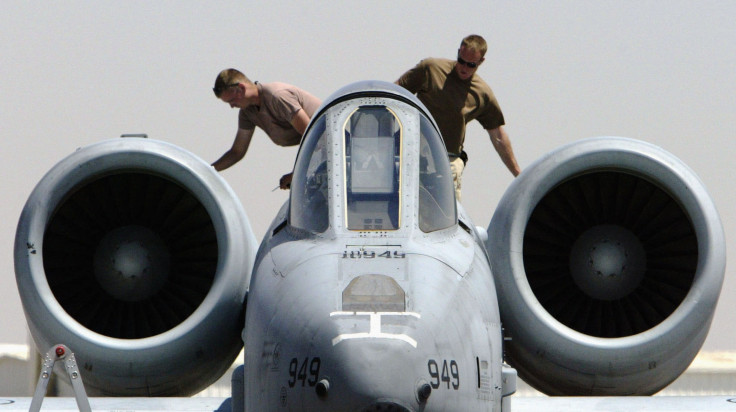A-10 Thunderbolt Given Reprieve As Senate And House Set To Vote On 2015 National Defense Authorization Act

The embattled warplane that Sen. John McCain loves and the U.S. just deployed to fight the Islamic State group will be spared for at least one more year as the House and Senate Armed Services Committees prepare to vote on a joint version of the National Defense Authorization Act of 2015. The bill, which is expected to be passed by the end of the week before being sent to the White House for approval, will authorize $521.3 billion in discretionary spending.
The Air Force wanted to cut the aging, but according to many supporters still useful, A-10 to save around $4 billion over the remainder of the plane’s expected service life. Political maneuvering earlier this year saved it from immediately being retired, and now with the proposed defense budget the plane officially gets to fly and fight for at least one more year.
Under the proposal, 36 of the aircraft, a little more than 10 percent of the total in service, would be placed in "backup flying status" and only flown to keep them in working order. This would free up maintenance personnel to assist on other aircraft in the fleet. The Air Force maintained that without taking maintenance personnel from the A-10 it could not introduce its newest fighter, the much-discussed F-35, the most expensive weapons program in history.
"Based on what the Air Force told us, the 36 aircraft going to backup flight status nets them about 100 maintenance people," a legislative aide told defense publication IHS Jane's. "They said they needed 800 in [fiscal year] 2015, so it is pretty thin gruel we're offering them."
Advocates had long fought for the A-10in Congress, arguing that it was the only aircraft that could adequately offer close combat support for troops on the ground. That argument is now stronger as the A-10 is now being used in Iraq to combat ISIS.
Alongside the A-10, the National Guard AH-64 Apache helicopters are also to be saved from retirement.
The defense spending bill has caused waves in Congress, as it will be the final defense budget before forced sequestration forces strict cuts to military spending in 2016, and the final one before the Senate Armed Services Committee is handed over to Republican rule, likely under McCain, R-Ariz., as chairman.
"A new bill will be filed today, and the House of Representatives plans to pass it without change and send it to the Senate by the end of this week," according to a statement by Senate Armed Services Committee Chairman Carl Levin, D-Mich., on Tuesday.
Levin said that no amendments would be allowed on the bill, which features a reduction of around $25 billion in spending from the previous year’s bill, most of which comes out of the contingency budget for overseas operations.
"At this point, there is no way that we can resolve disputes about which amendments should be debated, debate them, overcome potential filibusters, and still get the job done," he said. "We ask our colleagues to support us in bringing up and passing this bill without amendment as the best of a bad set of options,” Levin said.
© Copyright IBTimes 2024. All rights reserved.





















